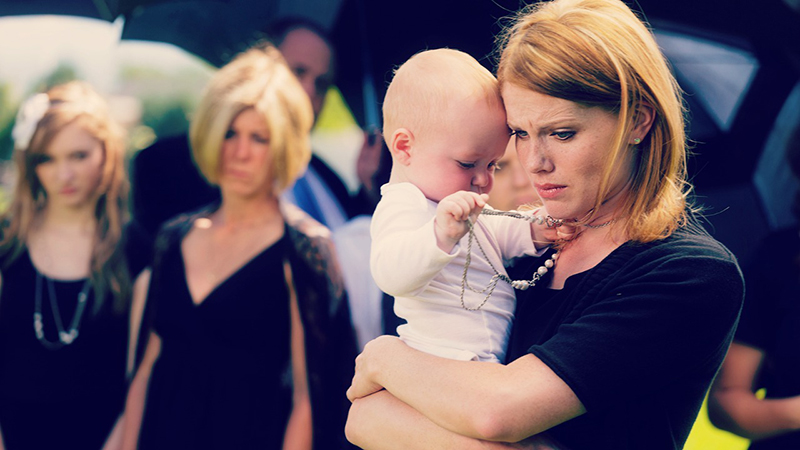Studies show losing a parent has a lifelong, permanent psychological effect on humans of all ages
The trauma of losing a parent has profound effects on us all, regardless of our age. Grief is so immeasurable that there are studies that show the death of our father or mother can actually change the chemistry of our brain and have lasting physical effects, too. Those changes can become pathological.
The way our brains processes grief is deep and complex. Research shows that the areas of our brain that processing grief, the posterior cingulate cortex, frontal cortex, and cerebellum are the same regions that retrieve memories and dwell on the past.

They’re also the same regions of the brain that regulate our sleep and appetites. This explains why, when we’re in a profound state of grief or depression, many people experience an increase in sleep, insomnia, or major differences in our appetite.
The loss of a parent, whether anticipated or suddenly tragic, leads to different levels and timetables of grief. Losing a parent at a younger age is usually a sudden loss that can lead to younger children and adults experiencing lengthy denial and anger phases of grief.
Having time to prepare and accept the loss of a parent when death is anticipated, offers the opportunity to say goodbye and find a good support system. This may be why other studies show that younger adults are more deeply affected by parental loss.

The loss of a parent can increase the risk of long-term emotional and mental health issues like depression, anxiety, etc. Losing a parent as a child only increases these odds, and about one in 20 children aged 15 and younger have suffered the loss of one or both parents.
Many of us have complex relationships with our parents – and some of us have none. The result of unresolved emotions such as anger and resentment also has a lasting effect on our psyche as well. The death of a parent means there is no hope of reconciliation or having your feelings validated.

The amount and intensity of grief experienced would depend on a few things, like the following:1. Equation shared with the parent
2. Psychological bent of mind
3. Previous experience with grief
4. Cause of death
To explore this issue further, a survey was conducted in the 1970s with about 11,000 people – some orphans, some from disturbed homes, and some from happy families. It was observed that the orphans grew up with a sense of incompleteness and the firm belief that life will never be as they wish, which is why they tend to be smokers.
It was found that orphans are more likely to suffer from mental illness. Another study was conducted from the point of view of children. It was noticed that the death of a parent has effects lasting as long as 70 years, and the child growing up without strong communication skills or a stable belief system within themselves. It should be noted that the death of a particular parent affects girls and boys differently. Boys tend to take their father’s death hard, and for girls, it’s their mother.

There has been a fair amount of brain imaging involved in this research and even though it is a highly technical approach to a very emotional thing, it provides valuable insight. It shows that grief affects the posterior cortex, frontal cortex, and cerebellum. This provides sufficient explanation for the physical discomfort and issues when faced by grief, which includes nausea, loss of appetite, dizziness, and so on.
When discussing grief, it would be remiss to not mention the 5 stage breakdown.
The first stage is denial, where the person in the face of grief due to some disaster refuses to accept that the said event has taken place at all.
The second stage is anger, where they hold others responsible for what happened and tends to be violent.
The following stage is bargaining– they try to make deals with whoever is watching upon us to reverse the situation for something in return.
The fourth stage is depression, where the person goes through extreme sadness and the final stage is acceptance, where they accept whatever has happened as it is and seek to find peace with it.
There are a few ways to deal with grief and sadness and they will be listed below.
1. Interventions: Sometimes people refuse to accept help or even recognize their situation. In those cases, people close to the sufferer can arrange an intervention. It reminds the person that they are loved and cared for.
2. Counseling: Sometimes one needs professional help and there is nothing with that. You deserve to be happy.
3. Support groups: Sharing your problems with people going through the same issues helps more than one can possibly imagine. Talking about your grief helps in making peace with it.
4. Medication: People often attach a sort of taboo to medication, but there is nothing wrong with it.
5. Socialization: Being around people helps serotonin levels greatly. The love of friends and family has an uplifting effect on everyone.
6. Self-care: One has to take care of their own self at one point or the other. At the end of the day, you are the only person who understands you the best.
7. Spiritual healing: Spirituality is always a source of comfort for a large number of people.
When it comes to the death of a parent, there is no such thing as “getting over it.” No matter what type of relationship you had with them or what kind of parent they were. It changes us deeply and permanently – mentally, physically, and emotionally – for the rest of our lives.

















